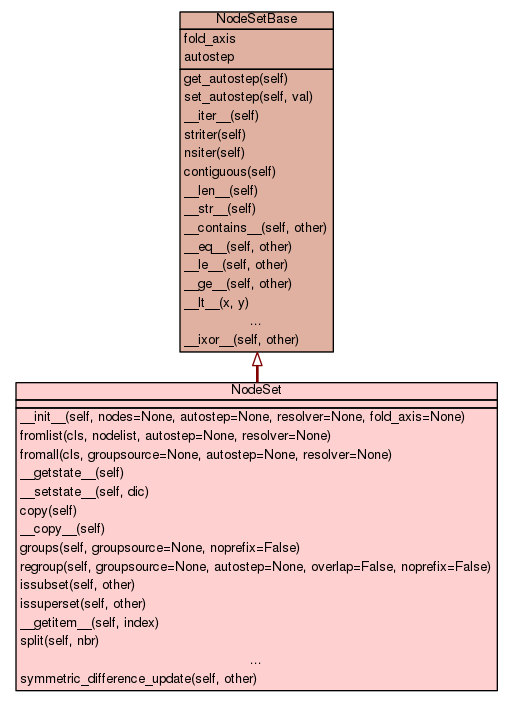
| Home | Trees | Indices | Help |
|
|---|
|
|

Iterable class of nodes with node ranges support.
NodeSet creation examples:
>>> nodeset = NodeSet() # empty NodeSet >>> nodeset = NodeSet("cluster3") # contains only cluster3 >>> nodeset = NodeSet("cluster[5,10-42]") >>> nodeset = NodeSet("cluster[0-10/2]") >>> nodeset = NodeSet("cluster[0-10/2],othername[7-9,120-300]")
NodeSet provides methods like update(), intersection_update() or difference_update() methods, which conform to the Python Set API. However, unlike RangeSet or standard Set, NodeSet is somewhat not so strict for convenience, and understands NodeSet instance or NodeSet string as argument. Also, there is no strict definition of one element, for example, it IS allowed to do:
>>> nodeset = NodeSet("blue[1-50]") >>> nodeset.remove("blue[36-40]") >>> print nodeset blue[1-35,41-50]
Additionally, the NodeSet class recognizes the "extended string pattern" which adds support for union (special character ","), difference ("!"), intersection ("&") and symmetric difference ("^") operations. String patterns are read from left to right, by proceeding any character operators accordinately.
Extended string pattern usage examples:
>>> nodeset = NodeSet("node[0-10],node[14-16]") # union >>> nodeset = NodeSet("node[0-10]!node[8-10]") # difference >>> nodeset = NodeSet("node[0-10]&node[5-13]") # intersection >>> nodeset = NodeSet("node[0-10]^node[5-13]") # xor
|
|||
|
|||
|
|||
|
|||
|
|||
|
|||
|
|||
|
|||
|
|||
|
|||
|
|||
|
|||
|
|||
|
|||
|
|||
|
|||
|
|||
|
|||
|
Inherited from Inherited from Inherited from |
|||
|
|||
|
|||
|
|||
|
|||
|
|||
_VERSION = 2
|
|||
|
|||
|
Inherited from |
|||
|
|||
|
Inherited from Inherited from |
|||
|
|||
Initialize a NodeSet object. The `nodes` argument may be a valid nodeset string or a NodeSet object. If no nodes are specified, an empty NodeSet is created. The optional `autostep` argument is passed to underlying :class:`.RangeSet.RangeSet` objects and aims to enable and make use of the range/step syntax (eg. ``node[1-9/2]``) when converting NodeSet to string (using folding). To enable this feature, autostep must be set there to the min number of indexes that are found at equal distance of each other inside a range before NodeSet starts to use this syntax. For example, `autostep=3` (or less) will pack ``n[2,4,6]`` into ``n[2-6/2]``. Default autostep value is None which means "inherit whenever possible", ie. do not enable it unless set in NodeSet objects passed as `nodes` here or during arithmetic operations. You may however use the special ``AUTOSTEP_DISABLED`` constant to force turning off autostep feature. The optional `resolver` argument may be used to override the group resolving behavior for this NodeSet object. It can either be set to a :class:`.NodeUtils.GroupResolver` object, to the ``RESOLVER_NOGROUP`` constant to disable any group resolution, or to None (default) to use standard NodeSet group resolver (see :func:`.set_std_group_resolver()` at the module level to change it if needed). nD nodeset only: the optional `fold_axis` parameter, if specified, set the public instance member `fold_axis` to an iterable over nD 0-indexed axis integers. This parameter may be used to disengage some nD folding. That may be useful as all cluster tools don't support folded-nD nodeset syntax. Pass ``[0]``, for example, to only fold along first axis (that is, to fold first dimension using ``[a-b]`` rangeset syntax whenever possible). Using `fold_axis` ensures that rangeset won't be folded on unspecified axis, but please note however, that using `fold_axis` may lead to suboptimial folding, this is because NodeSet algorithms are optimized for folding along all axis (default behavior).
|
Return a shallow copy of a NodeSet.
|
Find node groups this nodeset belongs to. [private] |
Find node groups this nodeset belongs to.
Return a dictionary of the form:
group_name => (group_nodeset, contained_nodeset)
Group names are always prefixed with "@". If groupsource is provided,
they are prefixed with "@groupsource:", unless noprefix is True.
|
Regroup nodeset using node groups. Try to find fully matching node groups (within specified groupsource) and return a string that represents this node set (containing these potential node groups). When no matching node groups are found, this method returns the same result as str(). |
Report whether another nodeset contains this nodeset.
|
Report whether this nodeset contains another nodeset.
|
Return the node at specified index or a subnodeset when a slice is specified.
|
Split the nodeset into nbr sub-nodesets (at most). Each sub-nodeset will have the same number of elements more or less 1. Current nodeset remains unmodified. >>> for nodeset in NodeSet("foo[1-5]").split(3): ... print nodeset foo[1-2] foo[3-4] foo5 |
s.update(t) returns nodeset s with elements added from t.
|
s.intersection_update(t) returns nodeset s keeping only elements also found in t.
|
s.difference_update(t) removes from s all the elements found in t. If strict is True, raise KeyError if an element in t cannot be removed from s.
|
s.symmetric_difference_update(t) returns nodeset s keeping all nodes that are in exactly one of the nodesets.
|
| Home | Trees | Indices | Help |
|
|---|
| Generated by Epydoc 3.0.1 on Wed Dec 21 14:07:52 2016 | http://epydoc.sourceforge.net |